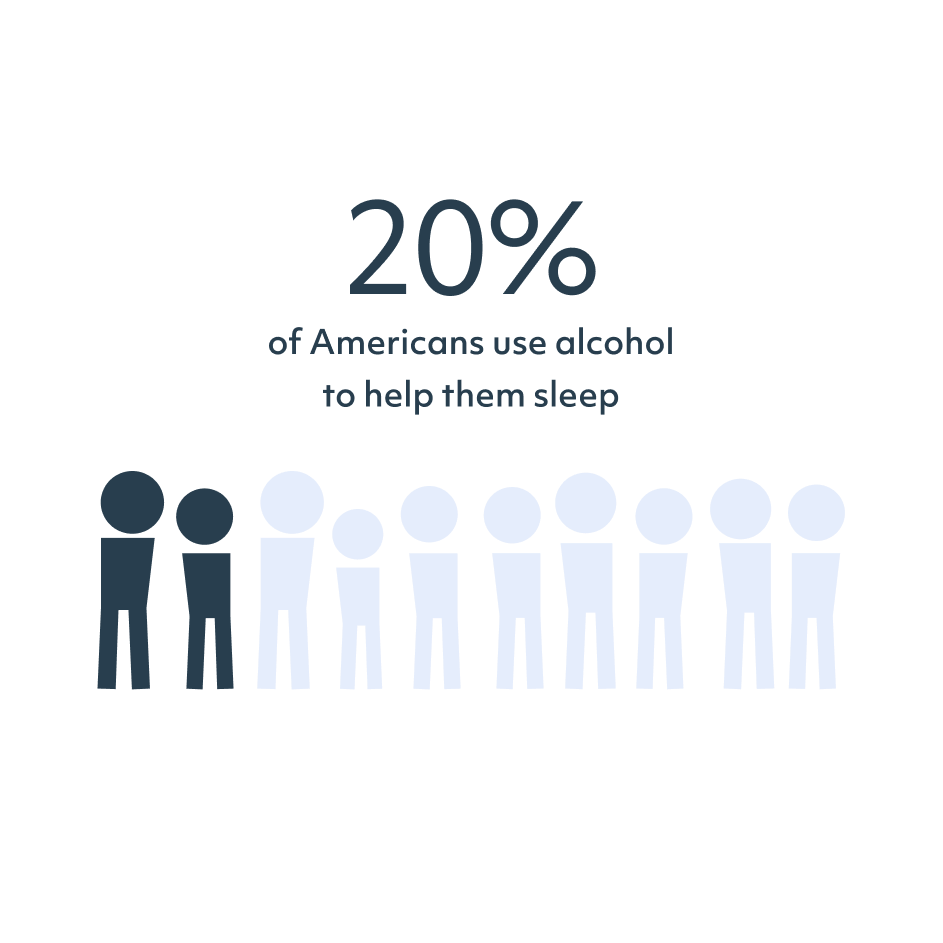Insomnia and Addiction
Many people begin drinking or substance use because they think it will help them sleep better, only to find that the opposite is true. Others develop insomnia due to their substance use disorder.
There are better sleep aids than alcohol
If you’re self-medicating with alcohol or drugs, you’re not alone. 20% of Americans use alcohol to help them sleep.
Self-medication with alcohol or drugs may help you fall asleep at first, as they disrupt the brain’s mechanism for regulating sleep and wakefulness. In the beginning, this disruption can help you to fall asleep, but it also reduces the quality of your sleep and interrupts the REM sleep cycle. This makes you more likely to wake in the middle of the night and experience insomnia as you try to get back to sleep.
For members of our opioid or alcohol use disorder programs, our clinical experts can help you stop this cycle of disrupted sleep and develop healthier sleep habits. You don’t have to dread bedtime anymore.

Eight hours a night can change your life
It’s estimated that 30% of adults have short-term insomnia, and another 10% suffer from chronic insomnia. Not getting enough sleep can lower your mood, your ability to concentrate, and is associated with increased health risks over the long term. This can have real consequences for your life.
Insomnia can also exacerbate mental health issues, like substance use disorder, anxiety, and depression.

FAQs: Treating Insomnia and Addiction
Insomnia is a sleep disorder characterized by an inability to get to sleep or stay asleep. Some people may experience waking early in the morning and have difficulty falling asleep again. People with insomnia often feel tired during the day and struggle to do day-to-day activities, as sleep deprivation impacts brain functioning and physical wellness. It can cause you to feel irritable, increase blood pressure, exacerbate chronic pain, and increase anxiety or depression.
It varies depending on which substances you use. Drinking alcohol can cause difficulties in both falling asleep and staying asleep, and withdrawal from alcohol can also cause insomnia. Cocaine and other stimulants (including caffeine) disturb your circadian rhythms, making it harder to fall asleep. Opioids may be sedating at first, but over time they disrupt sleep quality, and insomnia can linger even after you stop taking them. Cannabis use is associated with less time spent in REM sleep. All of these substances affect brain chemistry and impact your sleep patterns.
First, you will be given an assessment to help your provider understand the nature and severity of your sleep problem. Then your care team may recommend finding a provider that offers Cognitive Behavioral Therapy for Insomnia (CBT-I), which may include sleep hygiene education, relaxation therapy, stimulus control therapy, and sleep restriction therapy. They may also prescribe non-habit-forming sleep medicine when appropriate.
It depends on your needs and history. Workit Health providers may prescribe benzodiazepines as indicated for alcohol use disorder, which may be accompanied by insomnia. But because they have a high risk of physical dependence and of dangerous interaction with Suboxone (buprenorphine/naloxone), Workit Health providers usually do not prescribe benzos for members being treated for opioid use disorder.
Telemedicine support for insomnia
We make it easier than ever to get whole-person care for addiction, even when you have a dual diagnosis. Prioritizing secondary issues like insomnia ensures you feel your best and increases your chances of long-term recovery.
If you’re a member or Workit Health who has trouble sleeping talk with your Workit clinician about medication for insomnia.

Quit Opioids
Feel like yourself again with medication and recovery support.
Stop Drinking
Modern, personalized alcohol treatment from the privacy of home.
Treat co-occurring insomnia and addiction




